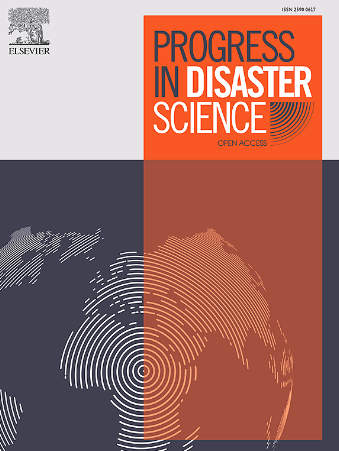Capturing information needs in disaster situations by using temporal and spatial offset learning (TSOL)
IF 3.8
Q3 ENVIRONMENTAL SCIENCES
引用次数: 0
Abstract
This paper presents a framework for identifying the offline information needs of persons in disaster situations by analyzing online behavioral logs and utilizing the users' location and search history. Two main challenges are addressed: accurately identifying persons most affected by the situation from noisy location data and distinguishing event-related search queries from unrelated ones. To tackle these challenges, we propose a machine-learning method, called temporal and spatial offset learning (TSOL), that incorporates both temporal and spatial distinctiveness. TSOL assigns heavier weights to these dimensions, in order to offset complexities and uncertainties surrounding user information. We validated the effectiveness of TSOL through experiments in actual disaster situations. The proposed framework and TSOL offer a promising approach to capturing and analyzing the information needs of individuals affected by disasters. The captured information needs in disaster situations have often been reported on TV in Japan as a support of those affected by disasters.

利用时空偏移学习(TSOL)获取灾害情况下的信息需求
本文通过分析在线行为日志并利用用户的位置和搜索历史,提出了一个识别灾害情况下人员离线信息需求的框架。解决了两个主要挑战:从嘈杂的位置数据中准确识别受情况影响最大的人,以及区分与事件相关的搜索查询和不相关的搜索查询。为了应对这些挑战,我们提出了一种机器学习方法,称为时空偏移学习(TSOL),它结合了时间和空间独特性。TSOL为这些维度分配了更大的权重,以抵消围绕用户信息的复杂性和不确定性。我们通过实际灾害情况下的实验验证了TSOL的有效性。提出的框架和TSOL为获取和分析受灾害影响的个人的信息需求提供了一种很有前途的方法。日本经常在电视上报道在灾害情况下捕获的信息需求,作为对受灾害影响的人的支持。
本文章由计算机程序翻译,如有差异,请以英文原文为准。
求助全文
约1分钟内获得全文
求助全文
来源期刊

Progress in Disaster Science
Social Sciences-Safety Research
CiteScore
14.60
自引率
3.20%
发文量
51
审稿时长
12 weeks
期刊介绍:
Progress in Disaster Science is a Gold Open Access journal focusing on integrating research and policy in disaster research, and publishes original research papers and invited viewpoint articles on disaster risk reduction; response; emergency management and recovery.
A key part of the Journal's Publication output will see key experts invited to assess and comment on the current trends in disaster research, as well as highlight key papers.
 求助内容:
求助内容: 应助结果提醒方式:
应助结果提醒方式:


